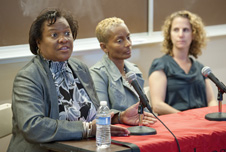When young women are exported and exploited

Advocates for victims of human trafficking spoke to law students yesterday, the first part of a two-day series of panels sponsored by the Northeastern University School of Law’s Human Rights Caucus.
“What you do and how you practice when you leave school really has an enormous impact on our work and the victims we serve,” said Lisa Goldblatt Grace, the program director of My Life My Choice, an organization that works with young girls who have been victims of human trafficking, specifically those forced to become sex workers.
Young victims need to trust the police officers, social workers and lawyers who advocate on their behalf, said Renee Payne-Callender, a Boston Police detective who spoke at the event.
“These girls need someone to advocate for them,” Payne-Callender said. “It’s important for me to build a rapport with them so I can understand the truth about a particular young lady, and it’s the same for you soon-to-be lawyers.”
Young girls forced into a life as a prostitute, stripper or other sex worker often see nothing wrong with their lives, explained Audrey Porter, the assistant director and coordinator of survivor services at My Life My Choice. Before working with victims, Porter was one herself: she spent years in Boston’s “Combat Zone” as a prostitute and stripper, developing a drug habit out of the need to cope with life on the streets.
“It is intense and I know they need you,” Porter said of the law students. “They need someone to advocate for them and let them see what this lifestyle really is.”
Students from the Law School began planning the two-day discussion on human trafficking last fall, at a time when Massachusetts was one of four states in the nation without a comprehensive human trafficking law, explained student organizer Sarah Allar. Since then, lawmakers have put a new bill in motion that would make it easier to refer victims to social services and prosecute the pimps and johns involved in a case.
The program continues at 4 p.m. today with a panel entitled “Combating Exploitation: Discussing Policy and Practice,” which will take place in 230 Dockser Hall on Forsyth Street.